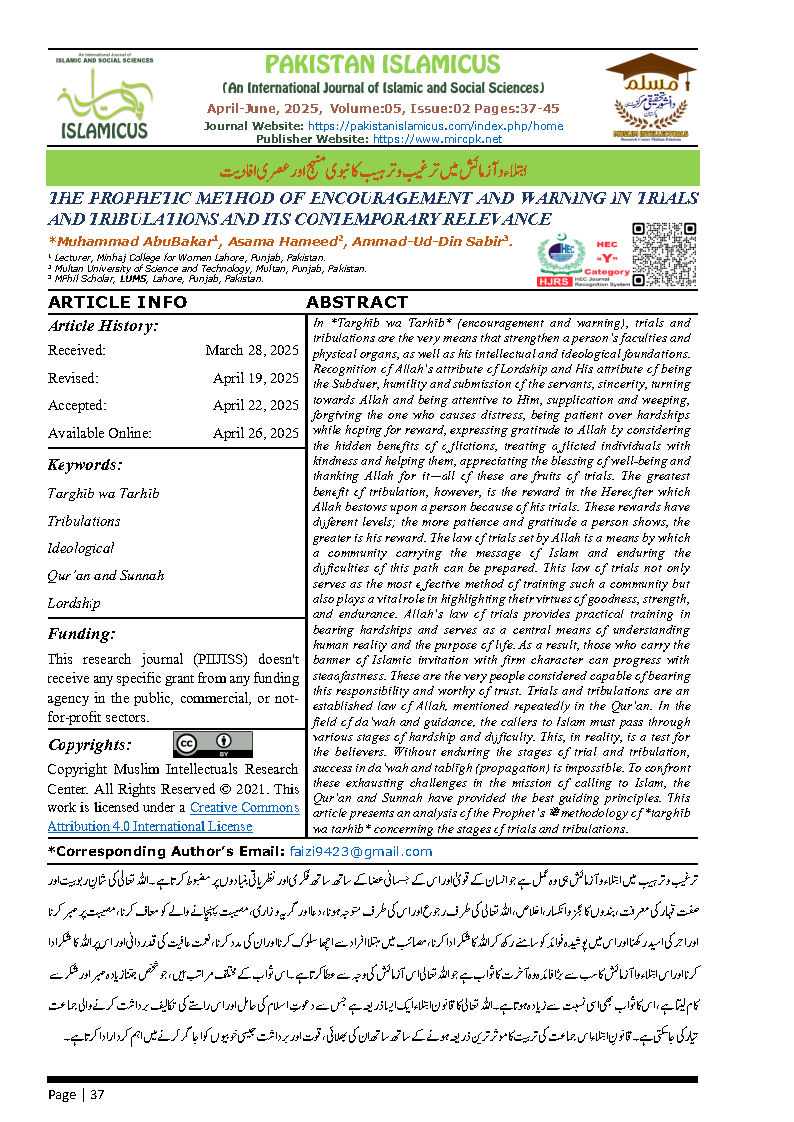ابتلاء و آزمائش میں ترغیب و ترہیب كا نبوی منہج اور عصری افادیت
THE PROPHETIC METHOD OF ENCOURAGEMENT AND WARNING IN TRIALS AND TRIBULATIONS AND ITS CONTEMPORARY RELEVANCE
Keywords:
Targhīb wa Tarhīb; Tribulations; Ideological; Qur’an and Sunnah; Lordship.Abstract
In *Targhīb wa Tarhīb* (encouragement and warning), trials and tribulations are the very means that strengthen a person’s faculties and physical organs, as well as his intellectual and ideological foundations. Recognition of Allah’s attribute of Lordship and His attribute of being the Subduer, humility and submission of the servants, sincerity, turning towards Allah and being attentive to Him, supplication and weeping, forgiving the one who causes distress, being patient over hardships while hoping for reward, expressing gratitude to Allah by considering the hidden benefits of afflictions, treating afflicted individuals with kindness and helping them, appreciating the blessing of well-being and thanking Allah for it—all of these are fruits of trials. The greatest benefit of tribulation, however, is the reward in the Hereafter which Allah bestows upon a person because of his trials. These rewards have different levels; the more patience and gratitude a person shows, the greater is his reward. The law of trials set by Allah is a means by which a community carrying the message of Islam and enduring the difficulties of this path can be prepared. This law of trials not only serves as the most effective method of training such a community but also plays a vital role in highlighting their virtues of goodness, strength, and endurance. Allah’s law of trials provides practical training in bearing hardships and serves as a central means of understanding human reality and the purpose of life. As a result, those who carry the banner of Islamic invitation with firm character can progress with steadfastness. These are the very people considered capable of bearing this responsibility and worthy of trust. Trials and tribulations are an established law of Allah, mentioned repeatedly in the Qur’an. In the field of da‘wah and guidance, the callers to Islam must pass through various stages of hardship and difficulty. This, in reality, is a test for the believers. Without enduring the stages of trial and tribulation, success in da‘wah and tablīgh (propagation) is impossible. To confront these exhausting challenges in the mission of calling to Islam, the Qur’an and Sunnah have provided the best guiding principles. This article presents an analysis of the Prophet’s ﷺ methodology of *targhīb wa tarhīb* concerning the stages of trials and tribulations.
Downloads
References
Al-Qur’ān, 7:125.
Al-Qur’ān, 18:7.
Ibn al-Qayyim al-Jawziyya, Abū ‘Abd Allāh Muḥammad ibn Abī Bakr, Al-Fawā’id (Kuwait: Maktabat al-Manār al-Islāmiyya, 1986), 283.
Ṣalābī, ‘Alī Muḥammad, Al-Sīra al-Nabawiyya (Saudi Arabia: Dār al-Salām, 2020), 2:178.
Bukhārī, Abū ‘Abd Allāh Muḥammad ibn Ismā‘īl, Al-Jāmi‘ al-Ṣaḥīḥ (Beirut: Dār al-Kutub al-‘Ilmiyya, 2001), Ḥadīth no. 6467.
Al-Qur’ān, 29:2.
Alī Muḥammad Ṣalābī, Al-Sīra al-Nabawiyya, 2:179.
Al-Qur’ān, 73:10.
Al-Qur’ān, 27:70.
Tirmidhī, Abū ‘Īsā Muḥammad ibn ‘Īsā, Sunan al-Tirmidhī (Beirut: Dār Iḥyā’ al-Turāth al-‘Arabī, 2000), Ḥadīth no. 3349.
Bukhārī, Abū ‘Abd Allāh Muḥammad ibn Ismā‘īl, Al-Jāmi‘ al-Ṣaḥīḥ, Ḥadīth no. 520.
Qushayrī, Imām Abū al-Ḥasan Muslim ibn Ḥajjāj, Ṣaḥīḥ Muslim (Beirut: Dār Iḥyā’ al-Turāth al-‘Arabī, 2000), Ḥadīth no. 2262.
Al-‘Umarī, Dr. Ḍiyā, Al-Sīra al-Nabawiyya al-Ṣaḥīḥa (Beirut: Dār Ṣādir, 1996), 1:149.
Ibn Hishām, ‘Abd al-Malik ibn Hishām, Al-Sīra al-Nabawiyya (Riyadh: Dār al-Maghnī, 1999), 1:350.
Ibn Hishām, Al-Sīra al-Nabawiyya, 1:352.
Al-Būṭī, Muḥammad Sa‘īd Ramaḍān, Fiqh al-Sīra (Beirut, Lebanon: Dār al-Fikr al-Mu‘āṣir, 2007), 88.
Al-Ghaḍbān, Munīr Muḥammad, Fiqh al-Sīra al-Nabawiyya (Saudi Arabia: Jāmi‘at Umm al-Qurā, 2008), 1:371.
Balādhurī, Aḥmad ibn Yaḥyā ibn Jābir, Ansāb al-Ashrāf (Beirut: Dār Ṣādir, 1901), 1:100.
Ibn Hishām, ‘Abd al-Malik ibn Hishām, Al-Sīra al-Nabawiyya, 2:54.
Al-‘Āmirī, Yaḥyā ibn Abī Bakr ibn Muḥammad, Bahjat al-Maḥāfil wa Bughyat al-Amthāl fī Talkhīṣ al-Sīra wa al-Mu‘jizāt wa al-Shamā’il (Beirut: Dār al-Minhāj, 2009), 192.
Yaḥyā ibn Abī Bakr al-‘Āmirī, Bahjat al-Maḥāfil, 193.
Munīr Muḥammad al-Ghaḍbān, Fiqh al-Sīra al-Nabawiyya, 1:217.
Ḥanbal, Abū ‘Abd Allāh Aḥmad ibn Muḥammad, Musnad Aḥmad ibn Ḥanbal (Beirut: Maktaba al-Islāmī lil-Ṭaba‘a wa al-Nashr, 1987), 1:62.
Munīr Muḥammad al-Ghaḍbān, Fiqh al-Sīra al-Nabawiyya, 1:217.
Munīr Muḥammad al-Ghaḍbān, Fiqh al-Sīra al-Nabawiyya, 100.
Ibn Sa‘d, Muḥammad ibn Sa‘d, Al-Ṭabaqāt al-Kubrā (Beirut: Dār Ṣādir, 1999), 3:116.
Suhaylī, ‘Abd al-Raḥmān ibn ‘Abd Allāh, Al-Rawḍ al-Anf (Beirut: Dār al-Kutub al-‘Ilmiyya, 2018), 2:195.
Abd al-Raḥmān ibn ‘Abd Allāh Suhaylī, Al-Rawḍ al-Anf, 2:196.
Abd al-Raḥmān ibn ‘Abd Allāh Suhaylī, Al-Rawḍ al-Anf, 2:197.
Ibn Isḥāq, Muḥammad ibn Isḥāq ibn Yasār, Al-Sīr wa al-Maghāzī (Beirut, Lebanon: Dār al-Fikr, 1987), 193.
Ḥākim, Muḥammad ibn ‘Abd Allāh Nīshāpūrī, Al-Mustadrak ‘alā al-Ṣaḥīḥayn (Beirut: Dār al-Kutub al-‘Ilmiyya, 2005), 3:221.
Alī Muḥammad Ṣalābī, Al-Sīra al-Nabawiyya, 2:246.
Muḥammad ibn Isḥāq ibn Yasār, Al-Sīr wa al-Maghāzī, 198.
Muḥammad ibn Isḥāq ibn Yasār, Al-Sīr wa al-Maghāzī, 105.
Muḥammad ibn Isḥāq ibn Yasār, Al-Sīr wa al-Maghāzī, 126.
Alī Muḥammad Ṣalābī, Al-Sīra al-Nabawiyya, 2:234.
Alī Muḥammad Ṣalābī, Al-Sīra al-Nabawiyya, 2:235.
Ibn Sa‘d, Muḥammad ibn Sa‘d, Al-Ṭabaqāt al-Kubrā, 3:137.
Abū Dāwūd, Sulaymān ibn al-Ash‘ath ibn Isḥāq ibn Bashīr, Sunan Abī Dāwūd (Beirut, Lebanon: Dār al-Kutub al-‘Ilmiyya, 2000), Ḥadīth no. 2649.

Downloads
Published
Issue
Section
License
Copyright (c) 2025 PAKISTAN ISLAMICUS (An International Journal of Islamic & Social Sciences)

This work is licensed under a Creative Commons Attribution 4.0 International License.
This work is licensed under a Creative Commons Attribution 4.0 International License.
































